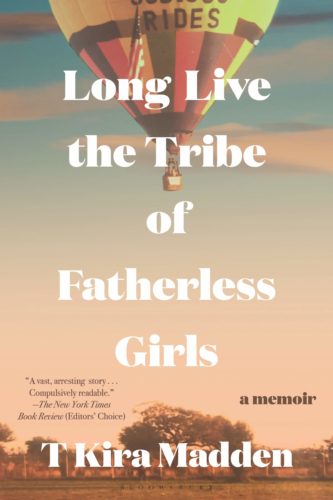
My love for Clarissa is so strong it changes the temperature of the air around us — that’s how it feels — which is precisely the thing about losers, the thing that binds us here on Mrs. Vag’s floor, and the thing that will bind us even after we change, grow up, become new people, meet other former and current losers: losers stick together. We recognize one another.
— T Kira Madden, Long Live the Tribe of Fatherless Girls
There are two ways to write a successful memoir. One is with sheer talent of prose, making even the ordinary moments of our lives shine with their own luster. The other is to recount kind of experiences that make most people go: “Holy crap, I can’t believe that’s been your life.”
Luckily for T Kira Madden, she gets to do both at once.
Long Live The Tribe of Fatherless Girls is Madden’s account of growing up queer and hapa in Boca Rotan, Florida. Awkward and alien even among similarly nouveau riche classmates (her uncle is Steve Madden of the shoe empire, just to give you a sense of the tax bracket), Madden was caught in the crux of both being the Other and having immense privilege. Her language is deeply creative and visceral, and she appreciates the surreal amidst the superficial; it’s Welcome to the Dollhouse as envisioned by Francesca Lia Block.
Another movie comparison: the book reads like the flip narrative to The Wolf of Wall Street — what all that excess and drug abuse looked like when it wasn’t cinematic enough to be adapted by Scorsese, the effects on family members and daily life. That’s not so much a comparison, however, as the actual truth. Madden’s father was good buddies with Jordan Belfort, and we’re left to assume he made a lot of his money the same way. Madden’s account is quite the palate-cleansing contrast to the movie — she talks about the house rules where she was effectively locked inside her room at night when “company” came over, the sex and drug parties she glimpsed when she managed to sneak out, how she was babysat by some of the shadiest characters you’d ever think to trust with a preteen. And that’s when she isn’t digging into the real darkness, such as her parents cycling in and out of rehab, or how her father, high as a kite, once chased Madden and her mother into a locked bedroom and beat the door with a baseball bat until it splintered. He didn’t remember the incident afterward, claimed his little girl must have broken the bat herself.
One of the striking elements of the book is Madden’s lack of anger, or accusation, toward either of her parents. She has anger, but she focuses it squarely on their dealers. When it comes to the adults directly responsible for her — the ones who lied to her, neglected her, once forgot about her entirely and left her at a baseball game — Madden spends a lot of time trying to contextualize their behavior, if not excuse it. Madden clearly loves them both, and the book’s overarching narrative (if it can be said to have one, more on that later) is about attempting to incorporate that love into her adult understanding of her trauma. She unpicks her mother’s past and insists she did the best she could. But it’s her father whom Madden really labors over, sifting through her memories like they contain precious grains of wheat, even as she acknowledges the growing excess of chaff. Madden’s father is alive for most of the book, which might seem to contradict its title — but as one character in a similar situation points out, your father doesn’t have to be literally dead in order to grow up fatherless. (He’s the one who left her at a baseball game.)
It’s Madden’s strained connection to her father, or lack thereof, which guides her choices in most of the relationships she chronicles in the book. Madden now identifies as gay, and her book touches on queer desire, but her overwhelming hunger for adult, or at least older, male attention dominates the narrative. Toxic boyfriends, abusers, predators — they all find their way into her life, and as Madden tells it, they’re all connected back to that initial disconnect. It was the first really big, really damaging crack in the foundation of her life.
And Madden’s own life contains considerable damage: eating disorder, assault, addiction. There is a lot of ugliness couched in the book’s beautiful prose. Details in the later chapters make it clear that Madden eventually overcame these obstacles: marriage to a supportive partner, repaired relationships with her parents, getting clean. But the book itself isn’t interested in the resolutions, or with much of the process of reaching them. Instead Madden seems to fixate on the worst parts, such as the more bigoted reactions to her coming out among an otherwise accepting family, or her teenaged partying and its excesses instead of how she came to be a lauded nonficition writer. Arguably, that’s because these things make for a more interesting story. It can still be frustrating, to feel like Madden doesn’t acknowledge how lucky, ultimately, she has been — especially how much of her family’s money contributed to that luck. For instance, after she all but flunks out of high school, Madden is sent to a Manhattan fashion school with her tuition and expenses paid. In these chapters she talks about her ongoing emotional turmoil, her struggles with queer identity — all of which is valid. But it’s hard to ignore how much better she had it than most with similar sorrows.
In fact many of the narrative threads of Long Live The Tribe of Fatherless Girls feel incomplete, and often we’re given endings and beginnings with no details of what happens between. Even in the very end, where the audience might finally believe Madden has reached a place of balance and perhaps emotional wholeness, a revelation in the last pages lands like a sucker punch. The book won’t give you any sense of resolution, and those in search of it should look elsewhere. But if you’re more inclined towards intensity, or a nostalgic look back at the weirdest aughts-era adolescence you never really lived, let T Kira Madden tell you stories of her tribe.
